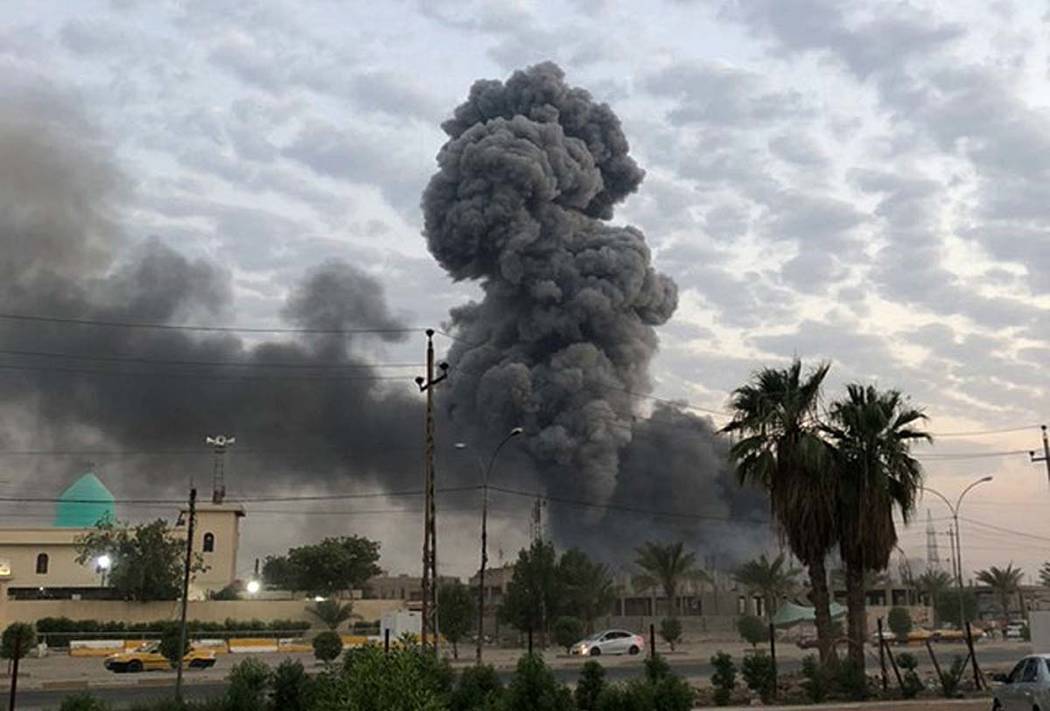Israel blamed for mystery hit on Iran-backed militia depot in Iraq

JERUSALEM — Israel was responsible for the bombing of an Iranian weapons depot in Iraq last month, U.S. officials have confirmed, an attack that would mark a significant escalation in Israel’s years-long campaign against Iranian military entrenchment across the region.
The confirmation comes as Israeli Prime Minister Benjamin Netanyahu is strongly hinting that his country is behind recent airstrikes that have hit bases and munitions depot belonging to Iran-backed paramilitary forces operating in Iraq.
The mystery attacks have not been claimed by any side and have left Iraqi officials scrambling for a response, amid strong speculation that Israel may have been behind them. Earlier this week, the deputy head of the Iraqi Shiite militias, known collectively as the Popular Mobilization Forces, openly accused Israeli drones of carrying out the attacks, but ultimately blamed Washington and threatened strong retaliation for any future attack.
Such attacks are potentially destabilizing for Iraq and its fragile government, which has struggled to remain neutral amid growing tensions between the United States and Iran.
Former Prime Minister Nouri al-Maliki, known for his strong allegiance to Iran, warned of a “strong response” if it is proven that Israel was behind the recent airstrikes in Iraq.
‘Battle arena’
In statements issued by his office on Friday, he also said that if Israel continues to target Iraq, the country “will transform into a battle arena that drags in multiple countries, including Iran.”
There have been at least three explosions at Iraqi Shiite militia bases in the past month. American officials now confirm Israel was responsible for at least one of them.
Two American officials said Israel carried out an attack on an Iranian weapons depot in July that killed two Iranian military commanders. The U.S. officials spoke on condition of anonymity because they were not authorized to discuss the matter with the media.
The July 19 attack struck a militia base in Amirli, in Iraq’s northern Salaheddin province, causing a huge explosion and fire. A senior official with the Shiite militias at the time told The Associated Press that the base hit housed advisers from Iran and Lebanon — a reference to the Iranian-backed Lebanese Hezbollah group. He said the attack targeted the headquarters of the advisers and a weapons depot.
Iranian media reported a funeral for a “shrine defender” named Abolfazl Sarabian on the next day, which typically denotes someone fighting in Iraq and Syria.
On August 12, a massive explosion at the al-Saqr military base near Baghdad shook the capital, killing one civilian and wounding 28 others. The base housed a weapons depot for the Iraqi federal police and the PMF. The most recent of the explosions came Tuesday night, at a munitions depot north of Baghdad.
Weeks of speculation
There have been weeks of speculation in Israel that the army is attacking targets in Iraq.
In an interview with a Russian-language TV station on Thursday, Netanyahu indicated the speculation is true.
“I don’t give Iran immunity anywhere,” he said, accusing the Iranians of trying to establish bases “against us everywhere,” including Syria, Lebanon, Yemen and Iraq.
Asked whether that means Israel is operating in Iraq, Netanyahu said: “We act in many arenas against a country that desires to annihilate us. Of course I gave the security forces a free hand and the instruction to do what is needed to thwart these plans of Iran.”
First Israeli airstrike since 1981
Early Friday, the New York Times, citing Israeli and U.S. officials, reported that Israel bombed an Iranian weapons depot in Iraq last month.
It would be the first known Israeli airstrike in Iraq since 1981, when Israeli warplanes destroyed a nuclear reactor being built by Saddam Hussein. It also steps up Israel’s campaign against Iranian military involvement across the region.
Israel has previously acknowledged hundreds of airstrikes on Iranian targets in neighboring Syria, primarily arms shipments believed to be destined for Iran’s Hezbollah allies.
Israel considers Iran to be its greatest enemy and has repeatedly vowed that it will not allow the Iranians, who are supporting the forces of Syrian President Bashar Assad, to establish a permanent military presence in Syria.
Possible aircraft routes
To strike Iraq, Israeli warplanes could potentially travel through neighboring Syria — although that would likely require Russian agreement.
The other, more complicated option would be for Israeli warplanes to travel through Turkey, a former ally that now has cool relations with Israel, or through Saudi Arabia, to carry out strikes on Iraq.
Israel and the Saudis do not have formal diplomatic relations, but are believed to have established a behind-the-scenes alliance based on their shared hostility toward Iran.
Israeli attacks in Iraq are potentially destabilizing for the volatile country, at a time when Iraq is beginning to recover from a devastating fight against the Islamic State group, and decades of war and conflict prior to that.
The comments by al-Maliki, who was Iraqi prime minister for eight years and now heads a Shiite bloc in parliament, follow fiery threats to the U.S. made hours earlier by the powerful Hezbollah Brigades, an Iran-backed militia. In a statement, it held the U.S. responsible for the strikes and said any new attacks will be met with a harsh response.
“Be sure that if the confrontation between us starts, it will only end with your removal from the region once and for all,” it said.
The U.S. maintains some 5,000 troops in Iraq, and some groups such as the Hezbollah Brigades want them to leave.